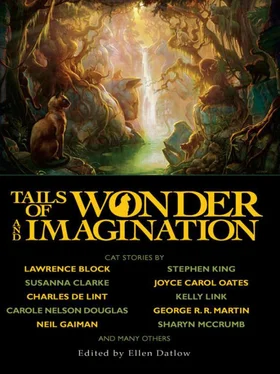Ellen Datlow - Tails of Wonder and Imagination
Здесь есть возможность читать онлайн «Ellen Datlow - Tails of Wonder and Imagination» весь текст электронной книги совершенно бесплатно (целиком полную версию без сокращений). В некоторых случаях можно слушать аудио, скачать через торрент в формате fb2 и присутствует краткое содержание. Год выпуска: 2010, ISBN: 2010, Издательство: Night Shade Books, Жанр: Фэнтези, Фантастика и фэнтези, Ужасы и Мистика, на английском языке. Описание произведения, (предисловие) а так же отзывы посетителей доступны на портале библиотеки ЛибКат.
- Название:Tails of Wonder and Imagination
- Автор:
- Издательство:Night Shade Books
- Жанр:
- Год:2010
- ISBN:978-1-59780-170-6
- Рейтинг книги:5 / 5. Голосов: 1
-
Избранное:Добавить в избранное
- Отзывы:
-
Ваша оценка:
- 100
- 1
- 2
- 3
- 4
- 5
Tails of Wonder and Imagination: краткое содержание, описание и аннотация
Предлагаем к чтению аннотацию, описание, краткое содержание или предисловие (зависит от того, что написал сам автор книги «Tails of Wonder and Imagination»). Если вы не нашли необходимую информацию о книге — напишите в комментариях, мы постараемся отыскать её.
collects the best of the last thirty years of science fiction and fantasy stories about cats from an all-star list of contributors.
Tails of Wonder and Imagination — читать онлайн бесплатно полную книгу (весь текст) целиком
Ниже представлен текст книги, разбитый по страницам. Система сохранения места последней прочитанной страницы, позволяет с удобством читать онлайн бесплатно книгу «Tails of Wonder and Imagination», без необходимости каждый раз заново искать на чём Вы остановились. Поставьте закладку, и сможете в любой момент перейти на страницу, на которой закончили чтение.
Интервал:
Закладка:
“Phooey on that,” said Gordon. “Where do I go to learn to be a cat?”
They thought he was joking, but as soon as Gordon was old enough to go places by himself, he packed a clean shirt and some peanut butter, and started off for cat school. “I love you very much,” he said to his parents before he left, “but this business of being hunted for the rest of my life just because I happened to be born a mouse is not for me.” And off he went, all by himself.
All cats go to school, you know, whether you ever see them going or not. Dogs don’t, but cats always have and always will. There are a great many cat schools, so Gordon found one easily enough, and he walked bravely up the front steps and knocked at the door. He said that he wanted to speak to the Principal.
He almost expected to be eaten right there, but the cats—students and teachers alike—were so astonished that they let him pass through, and one of the teachers took him to the Principal’s office. Gordon could feel the cats looking at him, and hear the sounds their noses made as they smelled how good he was, but he held on tight to the suitcase with his shirt and the peanut butter, and he never looked back.
The Principal was a fat old tiger cat who chewed on his tail all the time he was talking to Gordon. “You must be out of your mind,” he said when Gordon told him he wanted to be a cat. “I’d smack you up this minute, but it’s bad luck to eat crazies. Get out of here! The day mice go to cat school…”
“Why not?” said Gordon. “Is it in writing? Where does it say that I can’t go to school here if I want?”
Well, of course there’s nothing in the rules of cat schools that says mice can’t enroll. Nobody ever thought of putting it in.
The Principal folded his paws and said, “Gordon, look at it this way—”
“You look at it my way,” said Gordon. “I want to be a cat, and I bet I’d make a better one than the dopey-looking animals I’ve seen in this school. Most of them look as if they wouldn’t even make good mice! So let’s make a deal. You let me come to school here and study for one term, and if at the end of that time I’m not doing better than any cat in the school—if even one cat has better grades than I have—then you can eat me and that’ll be the end of it. Is that fair?”
No cat can resist a challenge like that. But before agreeing, the Principal insisted on one small change: at the end of the term, if Gordon didn’t have the very best marks in the school, then the privilege of eating him would go to the cat that did.
“Ought to encourage some of those louts to work harder,” the Principal said to himself, as Gordon left his office. “He’s crazy, but he’s right—most of them wouldn’t even make good mice. I almost hope he does it.”
So Gordon went to cat school. Every day he sat at his special little desk, surrounded by a hundred kittens and half-grown cats who would have liked nothing better than to leap on him and play games with him for a while before they gobbled him. He learned how to wash himself, and what to do to keep his claws sharp, and how to watch everything in the room while pretending to be asleep. There was a class on Dealing With Dogs, and another on Getting Down From Trees, which is much harder than climbing up, and also a particularly scholarly seminar on the various meanings of “Bad Kitty!” Gordon’s personal favorite was the Visions class, which had to do with the enchanting things all cats can see that no one else ever does—the great, gliding ancestors, and faraway castles, and mysterious forests full of monsters to chase. The Professor of Visions told his colleagues that he had never had such a brilliant student. “It would be a crime to eat such a mouse!” he proclaimed everywhere. “An absolute, shameful, yummy crime.”
The class in Mouse-Hunting was a bit awkward at first, because usually the teacher asks one of the students to be the mouse, and in Gordon’s case the Principal felt that would be too risky. But Gordon insisted on being chased like everyone else, and not only was he never caught (well, almost never; there was one blue Persian who could turn on a dime), but when he took his own turn at chasing, he proved to be a natural expert. In fact his instant mastery of the Flying Pounce caused his teacher and the entire class to sit up and applaud. Gordon took three bows and an encore.
There was also a class where the cats learned the necessities of getting along with people: how to lie in laps, how to keep from scratching furniture even when you feel you have to, what to do when children pick you up, and how to ask for food or affection in such a sweet manner that people call other people to look at you. These classes always made Gordon a little sad. He didn’t suppose that he would ever be a real “people” cat, for who would want to hold a mouse on his lap, or scratch it behind the ears while it purred? Still, he paid strict attention in People Class, as he did in all the others, for all the cats knew that whoever did best in school that term would be the one who ate him, and they worked harder than they ever had in their lives. The Principal said that they were becoming the best students in the school’s history, and he talked openly about making this a regular thing, one mouse to a term.
When all the marks were in, and all the grades added up, two students led the rankings: Gordon and the blue Persian. Their scores weren’t even a whisker’s thickness apart. In the really important classes, like Running And Pouncing, Climbing, Stalking, and Waiting For The Prey To Forget You’re Still There; and in matters of feline manners such as Washing, Tail Etiquette, The Elegant Yawn, Sleeping In Undignified Positions, and Making Sure You Get Enough Food Without Looking Greedy (101 and 102)—in all of these Gordon and the blue Persian were first, and the rest nowhere. Besides that, both could meow in five different dialects: Persian, Abyssinian, Siamese, Burmese (which almost no cat who isn’t Burmese ever learns), and basic tiger.
But there can only be one Top Cat to a term; no ties allowed. In order to decide the matter once and for all between them, the Principal announced that Gordon and the blue Persian would have to face one another in a competitive mouse roundup.
The Persian and Gordon got along quite well, all things considered, so they shook paws—carefully—and the Persian purred, “No hard feelings.”
“None at all,” Gordon answered. “If anyone here got to eat me, I’d much rather it was you.”
“Very sporting of you,” the Persian said. “I hope so too.”
“But it won’t happen,” Gordon said.
The blue Persian never had a chance. Once he and Gordon were set on their marks in a populous mouse neighborhood, Gordon ambushed and outsmarted and cornered all but a handful of the very quickest mice, and did it in a style so smooth, so effortlessly elegant—so catlike —that the Persian finally threw up his paws and surrendered. In front of the entire faculty and student body of the cat school, he announced, “I yield to Gordon. He’s a better cat than I am, and I’m not ashamed to admit it. If all mice were like him, we cats would be vegetarians.” (Persians are very dramatic.)
The cheering was so wild and thunderous that no one objected in the least when Gordon freed all the mice he had captured. Cats can appreciate a grand gesture, and everyone had already had lunch.
Gordon had won his bet, and, like the blue Persian, the Principal was cat enough to accept it graciously. He scheduled a celebration, which the whole school attended, and at the end of the party he announced that Gordon was now to be considered as much a cat as any student in the school, if not more so. He gave Gordon a little card to show that he was a cat in good standing, and all the students cheered, and Gordon made another speech that began, “Fellow cats….” As he spoke, he wished very much that his parents could be there to see what he had accomplished, and just how different things could be if you just asked questions and weren’t afraid of new ideas.
Читать дальшеИнтервал:
Закладка:
Похожие книги на «Tails of Wonder and Imagination»
Представляем Вашему вниманию похожие книги на «Tails of Wonder and Imagination» списком для выбора. Мы отобрали схожую по названию и смыслу литературу в надежде предоставить читателям больше вариантов отыскать новые, интересные, ещё непрочитанные произведения.
Обсуждение, отзывы о книге «Tails of Wonder and Imagination» и просто собственные мнения читателей. Оставьте ваши комментарии, напишите, что Вы думаете о произведении, его смысле или главных героях. Укажите что конкретно понравилось, а что нет, и почему Вы так считаете.












